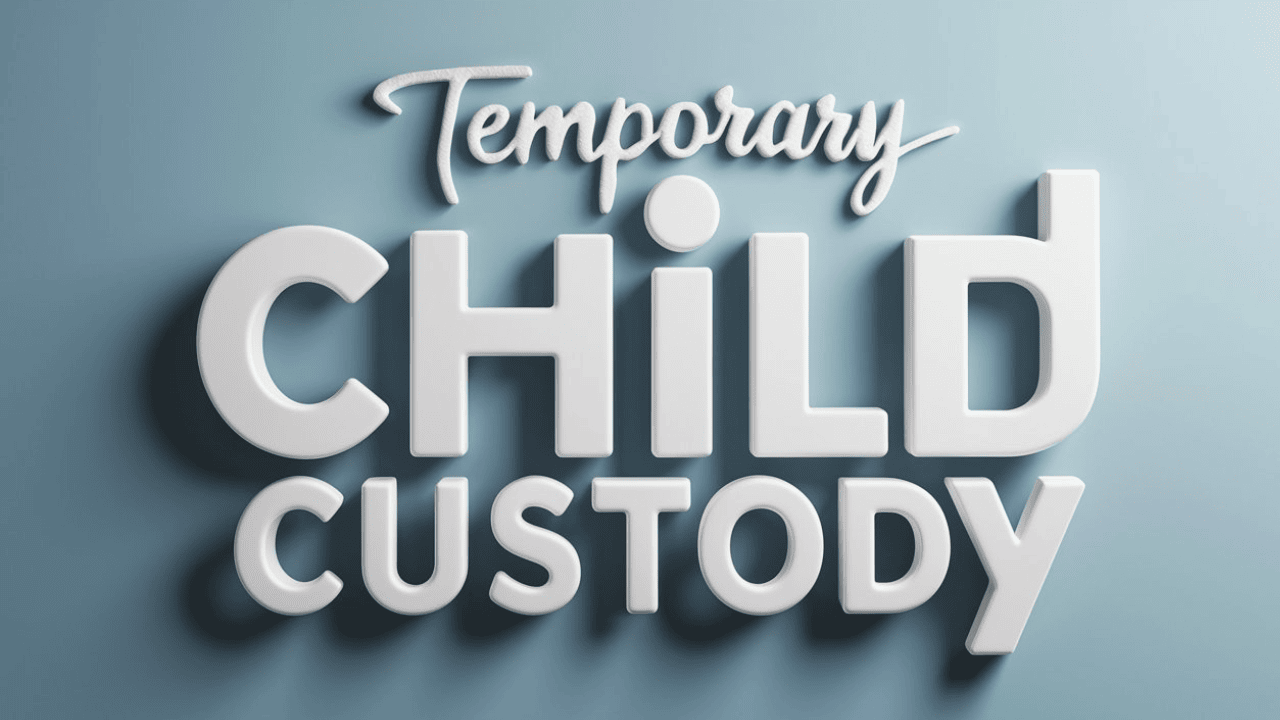
Navigating Temporary Child Custody Orders in North Carolina
In the case of Lawrence v. Lawrence, the North Carolina Court of Appeals examined the complexities of transitioning from temporary to permanent custody orders. This June 18, 2024, case highlights important legal principles that impact parents navigating child custody arrangements and the need for timely action and the helpfulness of clear, unambiguous language setting forth that an agreement is without prejudice.
Case Background
The parents of a minor child were embroiled in a custody dispute over their daughter.
After their separation in November 2018, they agreed on a temporary custody arrangement in January 2019, which was later modified in April 2019.
The Plaintiff sought a permanent custody arrangement, while the trial court ruled that the temporary orders had become permanent due to the passage of time without a final hearing.
The Plaintiff appealed this decision.
The NC Court of Appeals ruled:
- It is clear from the plain language of the Consent Order(s) that the agreement was entered without prejudice despite the failure to specifically include that term of art
- The trial Court’s ruling that the Consent Order and the Modified Consent Order transitioned to permanent Custody Order “by acquiescence” was in error
- The record “does not support” the trial Court’s conclusion that the Plaintiff failed to act in a timely fashion
- The trial Court’s conclusion that neither parent filed requests for no less than 18 months is “unsupported by the evidence”
- The relevant time period starts when the party requests a matter be set on for hearing, not when the hearing itself is held
Legal Principles and Court’s Reasoning
Temporary vs. Permanent Custody Orders
Temporary custody orders are intended to provide interim arrangements until a final custody decision is made.
These orders do not determine the parties’ ultimate rights and are usually short-term, designed to last only until a further court hearing.
Permanent custody orders, on the other hand, establish long-term arrangements that remain in effect until modified by the Court (the Judge).
Such orders can only be changed if a substantial change in circumstances affects the child’s well-being.
Determining Permanency: The Senner Test
The court applied the Senner test to determine whether an order is temporary or permanent. According to this test, an order is considered temporary if:
- It is entered without prejudice to either party.
- It states a clear and specific reconvening time within a reasonably brief interval.
- It does not determine all issues.
If an order fails to meet any of these criteria, the child custody order could be deemed permanent.
The trial Court in this case had to decide if the temporary orders issued in January and April 2019 had become permanent.
Operation of Time and Acquiescence
A temporary order can become permanent if the parties do not seek a final hearing within a reasonable time.
The focus is on whether a party has actively pursued a hearing.
In this case, the trial Court ruled that the temporary orders had become permanent by acquiescence, stating that neither party sought a hearing within 18 months.
When is the best time to get Divorced?
Court of Appeals Decision
The North Carolina Court of Appeals disagreed with the trial Court’s ruling, finding that the Plaintiff had indeed made reasonable efforts to seek a final hearing. The NC Court of Appeals noted that:
- The Plaintiff filed multiple calendar requests and notices for hearings on custody within nine months of the initial temporary order.
- The delays were largely due to external factors, such as the COVID-19 pandemic and attorney withdrawals, rather than any lack of action by the Plaintiff.
Based on these findings, the Court of Appeals reversed the trial court’s decision and remanded the case for further hearings to establish a permanent custody arrangement.
Implications for Parents
This case underscores the importance of clearly setting forth the temporary nature of initial custody orders and the need for timely legal action to protect and preserve legal rights.
Parents involved in custody disputes should actively pursue final hearings and ensure that any delays are documented and justified, instead of relying on a temporary child custody order. 
As a practical matter, including language within a Temporary Child Custody agreement setting forth the parties are not prejudiced is generally advisable but not necessarily dispositive.
It is helpful for the parties to make clear in the Consent Order that it is, in fact, a temporary custody arrangement that will be entered “without prejudice to the rights of either party.”
Indeed, even absent such “without prejudice” language, the Order may be deemed temporary if it is clear from the plain language within the Order that such Order will be entered without the loss of rights to either or both parties.
1. What is a temporary child custody order in North Carolina?
A temporary custody order provides a short-term arrangement for child custody while awaiting a final decision from the court. These orders establish immediate custody and visitation schedules to ensure stability and routine for the child during the legal process. Temporary custody orders help maintain the child’s well-being by outlining where the child will live and how much time they will spend with each parent until a permanent custody arrangement is determined.
2. How does a temporary order become permanent?
A temporary order can become permanent in North Carolina if it does not meet the criteria established by the Senner test, which includes:
- It is entered without prejudice to either party.
- It states a clear and specific reconvening time within a reasonably brief interval.
- It does not determine all issues.
If these criteria are not met, and neither party seeks a final hearing within a reasonable time, the court may deem the temporary order permanent by default. The court considers whether the parties have actively pursued a hearing and whether there have been justified delays. If a significant period passes without action, the temporary order may become permanent in certain circumstances. Thereafter, seeking a modification of child custody in North Carolina requires a substantial change in conditions.
That’s one reason it makes sense to consult with a family law attorney about the specific aspects of your legal matter. If you have a child custody matter in Charlotte, please call now to discuss the firm’s availability for legal representation and the costs associated with retaining our divorce lawyers in Mecklenburg County. Call: 704-342-4357
3. What is considered a reasonable time to seek a final hearing?
The definition of a “reasonable time” can vary depending on the circumstances. Generally, courts expect parties to seek a final hearing in a timely fashion. Factors like court availability, legal counsel changes, and external events like the COVID-19 pandemic can influence what is considered reasonable. The Court may also consider whether the parties have been actively engaged in negotiations and attempting to resolve child custody issues through means other than litigation.
4. Can a permanent custody order in North Carolina be modified?
Yes, a permanent custody order can be modified, but it generally requires a substantial change in circumstances that affects the child’s well-being. This could include changes in the child’s needs, a parent’s relocation, or significant changes in a parent’s ability to care for the child. The requesting party must provide evidence to support the need for modification.
5. What should I do if a child custody order is not working for my family?
If a temporary child custody order is not meeting your family’s needs, you should seek legal advice to discuss possible modifications. It is important to document any issues with the co-parent and communicate with your attorney about the most appropriate course of action and the best interests of your child. If the court is tasked with the responsibility of determining custody, it must ensure the child’s best interests are met.
6. How does collaborative divorce work in Charlotte?
Collaborative divorce is a process where both parties and their attorneys work together to negotiate a settlement without the intervention of a family court judge. This approach focuses on cooperation and communication, allowing the divorcing couple to resolve various issues amicably.
In a collaborative divorce, the couple works with their attorneys and may also involve other professionals, such as financial advisors or child specialists, to address and resolve key issues including:
- Equitable Distribution: The fair division of marital assets and debts.
- Child Custody: Determining where the children will live and how parenting time will be shared.
- Child Support: Establishing financial support for the children’s needs.
- Alimony: Deciding on financial support for one spouse post-divorce.
The goal of collaborative divorce is to create a mutually agreeable settlement that meets the needs of both parties and their children, fostering a more positive and respectful post-divorce relationship. Once an agreement is reached, it should be reviewed and approved by the court to become legally binding. This method often reduces the emotional and financial stress associated with traditional divorce litigation.
7. How do mediation and collaborative divorce impact custody decisions?
Both mediation and collaborative divorce can be effective methods for resolving custody disputes without prolonged court proceedings. During mediation, both parties work with a neutral third party to reach an agreement. Similarly, in a collaborative divorce, both parties and their attorneys work together to negotiate a settlement. If an agreement is reached in either process, it should be reviewed and approved by the court to become legally binding. Both approaches provide a less adversarial and more cooperative way to address custody arrangements, promoting a positive outcome for all involved.
8. What role does the child’s preference play in custody decisions?
The child’s preference can be a factor in custody decisions, especially if the child is older and capable of expressing a reasoned preference. Courts will consider the child’s wishes alongside other factors, such as each parent’s ability to meet the child’s needs and the overall stability of the proposed arrangements. The child’s best interests remain the primary consideration.
9. What are the key factors in determining custody arrangements?
Courts consider various factors when determining custody arrangements, including the child’s best interests, each parent’s ability to provide care, the child’s relationship with each parent, and the child’s stability and continuity of care. The goal is to create a custody arrangement that supports the child’s well-being and development.
10. How can I ensure a smooth transition from temporary to permanent custody?
To ensure a smooth transition from temporary to permanent custody, maintain active communication with your attorney, attend all court hearings, and comply with court orders. Document your involvement and efforts to provide a stable environment for the child. Seeking a timely final hearing and being prepared can help facilitate a smooth transition.
11. What if both parties agree on custody changes?
If both parties agree on custody changes, they may be able to submit the modified agreement to the court for approval. This ensures the changes are legally binding and enforceable. It is a good idea to work with legal counsel to ensure the agreement meets legal standards and addresses all relevant issues.
By understanding the legal principles and processes involved in child custody cases, parents can navigate the system more effectively and make informed decisions that prioritize their child’s well-being.
This blog post aims to provide a clear and comprehensive understanding of the legal principles involved in the Lawrence v. Lawrence case, helping parents grasp the complexities of temporary custody orders. If you would like more information about Child Custody legal issues in Charlotte, we may be able to help. Call Now: 704-342-4357
Helpful Information about Child Custody
- Charlotte Divorce FAQs
- How much is Child Support?
- Facing Domestic Violence Charges in Charlotte? Lawyer Up!
- Need a Criminal Defense Lawyer in Charlotte? Check out our other Criminal Law website
- Finding the right Child Custody Lawyer for you
- What is a Domestic Violence Protective Order?
- Do Separation and Divorce affect your child and school?
Charlotte Child Custody Lawyer – Bill Powers
In conclusion, the Lawrence v. Lawrence case, as deliberated by the North Carolina Court of Appeals on June 18, 2024, sheds light on the intricate processes involved in transitioning from temporary to permanent custody orders. This case underscores some of the vital legal principles that shape child custody in North Carolina, emphasizing the importance of timely action and the clarity of agreements made without prejudice. By understanding these nuances, parents can navigate the complexities of family law with greater clarity, helping to protect the best interests of children. If you are in need of a child custody lawyer in Charlotte and the surrounding counties of Union, Iredell, or Gaston County NC, please call 704-342-4357 now to schedule a confidential consultation.
Learn More

Removal of a Child from an Unfit Parent
Chapter 7B of the Juvenile Code regarding Abuse, Neglect, and Dependency proceedings sets forth the procedures and  protocols for the removal of a child from an “unfit parent.”
protocols for the removal of a child from an “unfit parent.”
North Carolina law Section 7B-906.2(b) requires the Trial Court to include possible reunification of parent and child as part of an initial “permanency plan.”
N.C.G.S. Section 7B-906.1(e)(1) further requires the Court to make formal findings regarding whether it is possible for the removed child or children to be returned (placed) with the parent within six months of the hearing.
In providing for the protection of juvenile children the District Court Judge must necessarily consider their needs, including those providing for permanence, safety, and continuity – Bill Powers, Family Law Attorney Charlotte NC
Standards of Removal of Child from Parent
Standards for removal, if and when such is necessary and appropriate, are also set forth in Chapter 7B of the Juvenile Code.
The Courts are charged with the duty to prevent inappropriate or unnecessary separation of parents and their children.
Do I need a lawyer for Child Custody?
In the event the Trial Court deems it necessary and proper to remove a child from the custody of a parent, those Standards for Removal necessarily require a review hearing formally designated as a Permanency Planning Hearing.
Such Review Hearing must be set within one year (12 months) of the date on which the Initial Order was entered. N.C.G.S. Section 7B-906.1(a)
Concurrent Plans for Permanency
The Trial Court, in considering removal, must adopt something called a concurrent plan.
To that end, there must be both primary and secondary plans over the permanency planning process and stage of the proceedings.
What is Collaborative Divorce?
The Court, as is the case in all family law and CPS Child Protective Services matters in North Carolina, considers such issues in light of the best interests of the child or children at issue.
There are six “statutory plans” for permanency as adopted and directed by the North Carolina General Assembly.
Those include things like:
- Reinstatement of Parental Rights
- Adoption
- Guardianship
- Reunification with Parent(s)
Duties of the Court
The Trial Court, during the Permanency Planning Hearing, is required to adopt “concurrent permanent plans.”
The Trial Court (the District Court Judge in North Carolina) is mandated to identify both a primary plan and a secondary plan, subject to certain legal exceptions.
First Steps in Divorce in Charlotte
Reunification with a parent, either as a primary or secondary plan, is required including written findings of fact indicating:
- Efforts toward reunification would be consistent/inconsistent with the safety or health of the minor child (juvenile) OR
- Reunification efforts would clearly be unsuccessful
The Court is also required to Order the Department of Social Services (within the county of the issue) to make efforts to finalize the primary and secondary permanent plans.
The Court may additionally specify efforts that are reasonable to achieve permanence for the juvenile in a timely manner.
In Re N.A.
The North Carolina Court of Appeals, in the unpublished opinion In Re N.A. (2021-NCCOA-2), addresses the issue of Findings relative to a primary and secondary permanency plan.
Therein the Court affirms that the NC Juvenile Code (NCGS Chapter 7B) equires the trial court to include reunification when it determines the Permanent Plan for the first time as either a primary or secondary plan.
Writing on behalf of the Court, Judge J. Hampson makes clear,
Reunification must be part of an initial permanent plan.
The General Assembly in Chapter 7B requires, regarding a reunification plan, “presupposes” a prior concurrent plan existing including reunification.
Legal Issues involving Divorce with Children
As part of the initial permanency plan, reunification is required and is not otherwise limited by procedural circumstances.
Therefore, if there has been no prior concurrent plan including reunification with a parent, a Permanency Plan Hearing must necessarily include, at least in part, reunification as part of the permanent plan.
A parent may be deemed, as a matter of law and fact, not a fit or proper to provide for the control of the juvenile, custody, or care of the juvenile child(ren).
If reunification has not previously been a primary or secondary aspect of the Court’s consideration, the Court must thereafter do so.
N.C.G.S. Section 7B-906.1(e)(1) mandates the Trial Court, in legal proceedings where the parent is not reunified with the juvenile child, make findings regarding whether or not it’s possible for the juvenile to be placed with a parent (within six months).
The Court, as part of any such finding(s) must also set forth with some level of specificity why, considering the juvenile’s Best Interests, cannot be returned to the parent.
Charlotte Family Law Attorneys – Powers Law Firm PA
Family Court matters, including those within the Court’s jurisdiction under Chapter 7B of the Juvenile Code, deserve careful consideration of the law and facts.
Family law issues involving juvenile children, we believe, are best reviewed holistically. Chapter 50 Divorce Proceedings in Charlotte involving DSS merit close scrutiny – Child Protective Services – Bill Powers, Charlotte Divorce Lawyer
If you have legal questions about your rights and duties as a parent, specifically those involving Best Interest issues, please call the divorce lawyers and family law attorneys at Powers Law Firm PA.
Consultation fees for such legal matters apply. Prior to discussing your legal matter, our Charlotte law firm confirms availability for legal representation.
Learn More
Child Custody and Visitation During COVID-19
 Child Visitation in North Carolina
Child Visitation in North Carolina
The Coronavirus and COVID-19 changes how we live day-to-day.
That involves more than just grocery shopping, doctor visits, and going to work.
Parents of children subject to a Child Custody Order or other negotiated Consent Orders are working through school shutdowns, social distancing, and lack of work-related-childcare.
Well-intended, historically sound methods and terms of visitation are being tested during the Coronavirus outbreak – Bill Powers, Charlotte Family Law Attorney
Goals of Parenting Plans and Child Custody
The “polar star” in North Carolina Family Court, relative to child custody, visitation, and support issues is the Best Interest of a minor child or children.
Child Custody requires stability and consistency.
Reasonable minds may differ in determining what indeed is in the best interests of the child.
Indeed, the fact is a fair number of people both in North Carolina and nationwide do not agree with the “best” method to deal with the Coronavirus.
One must ensure the best interests of children and follow directives of the Governor as well as the advice of healthcare professionals – Bill Powers
Families should work together and proceed reasonably in enabling the purposes and intent of Child Custody Orders and parenting agreements.
If consensus cannot be found, the NC Custody Mediation Program may a viable resource to help resolve disputes.
Chapter 50B – Protective Orders During COVID-19
Custody Orders pursuant to an “DVPO” or “Domestic Violence Protective Order” may add a level of complexity to an already complicated family law legal issue.
If you have a legal question regarding a 50B Order or other child custody issue, our Charlotte family law attorneys recommend you consult with an attorney.
Call your attorney before proceeding forward. If you don’t have a lawyer, retain legal counsel immediately.
Lawyers and law offices are deemed “essential professional services” and are imperative to the administration of justice in NC.
Many, if not most, divorce lawyers in Charlotte remain open for business and/or legal consultation even with Mecklenburg County courts largely closed.
Our office is open and helping people with their family law questions – – Bill Powers
Given safety concerns, we are “meeting” clients via secure video conferencing, telephone appointments, and other remote-access formats.
Violation of a valid 50B Order is a Class A1 Misdemeanor in North Carolina, subjecting the offender (the Defendant) to up to 150 days in jail.
Failing to comport with any Court Order relative to child custody, child support, or visitation may also result in sanctions by the Court for contempt proceedings.
Does the Stay at Home Order affect Visitation and Child Custody?
Non-essential travel in North Carolina is precluded by Governor Roy Cooper’s “Stay at Home Order” as issued on March 27, 2020.
Travel for child custody and visitation is authorized under the Order Section 1 – Stay at Home, 3(viii) Place of Residence:
To return to or return travel between one’s place or places of residence for purposes including, but not limited to, child custody or visitation arrangements – NC Stay at Home Order
Mothers and Fathers should continue to comply with all Custody Orders and Parenting Plans while they remain in legal effect, unless directed and/or Ordered by Judicial Order, other executive order, or supplemental Governor Orders.
Parties, as directed in the statewide Stay at Home Order, must also comply with any greater restrictions as set forth in local orders:
- Mecklenburg County Stay at Home Order
- Stay at Home Information for Union County NC
- Iredell County COVID-19 Information
- Gaston County NC Stay at Home Order
Travel between states for custody and visitation may be subject to restrictions. Before traveling to and from North Carolina, parents should research travel restrictions.
Custody Rights and COVID-19 Preventative Measures
Parties with visitation rights, custody rights, and parents should take special care to stay informed of and comply with recommendations regarding caring for children made by the Centers of Disease Control and Prevention or “CDC.”
Do not rely on local or national media coverage in decision-making relative to child custody and care protocols. NC Family Court Judges will likely default to scientifically based, official CDC protocols, not what the ‘talking heads’ on TV may opine – Bill Powers, Charlotte Divorce Lawyer
Denial of Parenting Time or Custody
In-and-of-itself, the Coronavirus and possible contagion of the novel COVID-19 virus likely is NOT a legally viable reason to deny parenting time and/or visitation.
Unless deemed otherwise by a Family Court Judge, parents deemed “fit” to care for and make decisions in the best interests of their child or children while those children are in their care.
Day-to-day care and decision making authority must comply with federal, state, and local health directives including hygienic health measures, social distancing, and travel.
Charlotte lawyers who handle Child Custody and Visitation
If you live in Charlotte-Mecklenburg have legal questions regarding a family law legal issue, we strongly recommend you consult with an attorney.
Each case, like constitutes a family-unit is different and unique.
Do not rely on gut instincts or what well-meaning friends and family may say.
Retain legal counsel before proceeding forward.
The Charlotte-based Powers Law Firm PA may be able to help.
Prior to speaking with a family law attorney at our firm we will conduct a “conflicts check.”
Consultation fees DO APPLY for all legal consultations regarding separation, divorce, custody, visitation, et al.
Learn More
IN RE A.U.S. and A.X.D.
IN THE SUPREME COURT OF NORTH CAROLINA
No. 133A19
Filed 27 September 2019
IN THE MATTER OF A.U.D. and A.X.D.
Appeal pursuant to N.C.G.S. § 7B-1001(a1)(1) from an order entered on 20
December 2018 by Judge Donald Cureton Jr. in District Court, Mecklenburg County.
This matter was calendared in the Supreme Court on 11 September 2019 but
determined on the record and briefs without oral argument pursuant to Rule 30(f) of
the North Carolina Rules of Appellate Procedure.
Heyward Wall Law, P.A., by Heyward G. Wall, for petitioner-appellant Bethany
Christian Services.
Edward Eldred for respondent-appellee father.
DAVIS, Justice.
This case involves a private termination of parental rights proceeding initiated
by petitioner Bethany Christian Services (BCS) against respondent-father. In this
appeal, we consider whether the trial court erred by declining to terminate
respondent’s parental rights to his children based on its determination that
termination would not be in the best interests of the children. Because we conclude
that the trial court’s ruling was within its discretion, we affirm.
Factual and Procedural Background
IN RE: A.U.D. AND A.X.D.
Opinion of the Court
-2-
Tanya1 and respondent began a relationship in 2016, and Tanya became
pregnant with twin girls, Amy and Ann (collectively, the children), shortly thereafter.
The parties never married, and their relationship ended prior to the children’s birth.
In September 2016, Tanya falsely informed respondent that she had miscarried and
ended contact with him. In January 2017, respondent encountered Tanya at the
hospital where she worked and noticed that she appeared to be pregnant. However,
respondent did not ask her about the pregnancy.
Respondent pled guilty to being a habitual felon in February 2017 after being
convicted of assault with a deadly weapon with the intent to kill or inflict serious
injury.2 While incarcerated, respondent learned that Tanya was, in fact, pregnant
and due to deliver in May 2017. In April 2017, respondent wrote to North Carolina
Prisoner Legal Services for assistance in establishing paternity. Per its instructions,
he attempted to submit a complaint and affidavit of parentage with Mecklenburg
County Child Support Enforcement, but the documents were never actually filed with
the clerk of court.
After the children’s birth in May 2017, Tanya initially cared for them. In June
2017, however, she placed them in the care of Sarah, the children’s maternal aunt.
On 3 August 2017, Tanya relinquished her parental rights to the children to BCS, an
adoption agency. Later that month, Tanya visited Sarah’s home with two social
1 Pseudonyms are used throughout this opinion to protect the identities of the
juveniles and for ease of reading.
2 Respondent has a projected release date of August 2021.
IN RE: A.U.D. AND A.X.D.
Opinion of the Court
-3-
workers, who proceeded to take custody of the children. Shortly thereafter, Sarah
obtained emergency custody of the children in District Court, Mecklenburg County.
BCS filed a motion to intervene in the custody action and was awarded custody. BCS
subsequently placed the children with a prospective adoptive family, where they have
lived through the present date.
On 28 August 2017, BCS filed a petition to terminate respondent’s parental
rights in District Court, Wake County on the grounds of neglect, failure to legitimate,
and dependency. See N.C.G.S. § 7B-1111(a)(1), (5), (6) (2017). Respondent then
sought an adjudication of paternity and filed an answer to BCS’s petition. The results
of respondent’s DNA test showed a 99.99% probability of paternity as to the children.
Respondent also executed an affidavit of parentage. On 18 May 2018, the court
entered an order declaring him to be the children’s father. In August 2018, the court
granted respondent’s motion to change venue, and the termination of parental rights
matter was moved to Mecklenburg County.
A hearing on the petition to terminate respondent’s parental rights was held
before the Honorable Donald Cureton Jr. on 7 December 2018 in District Court,
Mecklenburg County. At the hearing, the trial court heard testimony from
respondent, Tanya, Sarah, the children’s guardian ad litem, and the prospective
adoptive parents.
On 20 December 2018, the trial court entered an order in which it concluded
that although a ground existed to terminate respondent’s parental rights under
IN RE: A.U.D. AND A.X.D.
Opinion of the Court
-4-
N.C.G.S. § 7B-1111(a)(5), termination was not in the best interests of the children.
Accordingly, the trial court denied BCS’s petition. BCS gave timely notice of appeal
to this Court.
Analysis
In this appeal, BCS argues that the trial court failed to make sufficient findings
of fact in its 20 December 2018 order and abused its discretion when it determined
that termination of respondent’s parental rights was not in th

Charlotte Child Custody and Contempt of Court
 The North Carolina Court of Appeals ruled this week on a longstanding Charlotte child custody and contempt of court legal issue, described as, “an exceptionally contentious and prolonged custody battle” between a father and mother in Mecklenburg County Family Court. Litigation began in January 2007 involving the custody of two children, one of whom has since “aged out” and has been the subject of various Show Cause Orders, Motions to Show Cause, Charlotte child custody and Contempt of Court proceedings since he was 11 years old.
The North Carolina Court of Appeals ruled this week on a longstanding Charlotte child custody and contempt of court legal issue, described as, “an exceptionally contentious and prolonged custody battle” between a father and mother in Mecklenburg County Family Court. Litigation began in January 2007 involving the custody of two children, one of whom has since “aged out” and has been the subject of various Show Cause Orders, Motions to Show Cause, Charlotte child custody and Contempt of Court proceedings since he was 11 years old.
Another daughter, who is now 17, is the subject of the present appeal in the Charlotte Family Court matter entitled Grissom v. Cohen. To download a copy of the NC Court of Appeals opinion as published on October 2, 2018, see: Charlotte Contempt of Court Child Custody 2018
The extent and nature of the litigation in the matter is remarkable, involving four different Charlotte Family Court Judges, 600+ findings of fact in 2 Custody Orders and at least two full child custody trials in Mecklenburg County. While truly extraordinary in scope and duration, it does serve as an example of the lengths to which parents will fight for child custody and visitation in Charlotte – Bill Powers, Divorce Lawyer Charlotte NC
Contempt of Court and Charlotte Child Custody Issues
In the latest round of litigation and appeals from a ruling by the Honorable Matthew Osman in Charlotte Family Court, the Plaintiff in the appeal (the mother Ms. Grissom) complained that the trial judge made a mistake by, “Failing to hold Father in civil contempt” and in effect, ending or eliminating the mother’s primary custody of a child.
Specifically, the attorney for the mother, a divorce lawyer Charlotte NC, alleged the district court judge:
- Applied the wrong Burden of Proof, confusing the differences and standards of proof, and who had the burden of proof, between
- Civil Contempt of Court – Greater Weight of the Evidence
- Criminal Contempt in Charlotte NC – Beyond a Reasonable Doubt
- Failed to acknowledge or enforce an alleged “Forced Visitation Order”
- Refused to find the father in Contempt of Court
The Court of Appeals disagreed on several legal issues, specifically writing the Plaintiff, “Makes the bold and legally impossible request that this Court make the factual determination” that the Defendant in the case (the father Mr. Cohen) violated the Modified Custody Order, that the father “willfully violated” the Custody Order, demanding the NC COA reset the case for trial for civil contempt.
One would be remiss in failing to note who wrote the Grissom v. Cohen opinion for the Court of Appeals, the Hon. Donna Stroud.
To say her Honor is dedicated to precision, especially in drafting Orders in civil court involving family law cases, and the associated legal standards applied at the appellate level to NC Family Law matters, is an understatement. The Grissom case, as it will likely come to be known among divorce lawyers in Charlotte and other family court jurisdictions, discusses a wide range of legal issues involving contempt of court, the burdens of proof for Show Cause Orders, the roles of family law judges, and the realities of child custody disputes.
Judge Stroud recently spoke to a Charlotte divorce lawyer seminar (continuing legal education CLE), sponsored by the Mecklenburg County Family Law section, titled, “Writing Good Orders – What Judges Want Family Law Lawyers To Know About Drafting Orders.” The Grissom v. Cohen ruling reminds family law attorneys there are important differences and distinctions between criminal contempt vs civil contempt.
Some of the more “big picture” legal issues in Grissom focus on:
- Family Court Judges in Charlotte and their duties- the “Trial Judge” has the responsibility to be the Finder of Fact. In divorce and family law disputes, the district court judge hears testimony at trials and during motions, listens to the evidence, weighs the evidence, resolving differences and conflicts in the evidence presented between the parties, and thereafter makes Findings of Fact and Conclusions of Law.
- The Appellate Courts in NC review, in family law cases, things like the appropriate Standard of Proof, Conclusions of Law, and whether the Conclusions, as a matter of law, are supported by the Findings of Fact. Generally, the Court of Appeals rules on whether legal issues or matters of contention, regarding the application of the NC Family Laws (including child custody, child support, contempt of court, etc.), were proper. Put simply, appellate courts review the application of the NC Family Laws and, when necessary, interpret the N.C.G.S. and other constitutional considerations. The Family Court Judge answers questions like, “Who gets the kids?” and “How much is child support in North Carolina?”
- The appellate courts also address technical differences between the Findings of Fact, Conclusions of Law, and the roles of the Courts. The Court of Appeals in family law cases does not review, on a de novo (“of new” or “for anew” in Latin) basis, contempt orders. They do not “re-try” the case or change legal rulings of a family law judge, even if they may have personally ruled another way. Appellate courts rule on the law, giving wide discretion to rulings by family court judges regarding factual issues, absent an abuse of discretion. Generally speaking, family court judges interpret evidence and decide factual disputes. Appellate judges look at the legal rulings, making certain the NC Family Laws are followed.
The legal standard of review in Charlotte family law cases involving contempt of court trials is whether there was competent evidence to support the Findings of Fact by the trial judge and further whether the Conclusions of Law by the Family Court judge were supported by the Findings of Fact – Bill Powers, Charlotte Divorce Lawyer
A key takeaway from the ruling is that unchallenged Findings of Fact are presumed accurate and otherwise supported by the competent evidence. That means they cannot be challenged on appeal, as they are described by family law attorneys as, “Binding on Appeal.” That is not to say the Appellate Courts of North Carolina cannot review rulings by Family Court Judges. Legal conclusions or what family law lawyers call, “Conclusions of Law” may be reviewed de novo by the NC Court of Appeals.
Call Bill Powers, Divorce Lawyer Charlotte NC NOW: 704-342-4357
Learn More
A Review of the Child Custody Determination Process
 The Uniform Child Custody Jurisdiction and Enforcement Act (UCCJEA) is a uniform law drafted by the Uniform Law Commission in 1997. The UCCJEA encompasses a set of guidelines for courts to follow in their determination of child custody. To date, the law has been adopted by 49 states and Washington, DC. The UCCJEA breaks down legal and physical custody, sole and joint custody, grandparent visitation rights as well as factors to assess custodial rights.
The Uniform Child Custody Jurisdiction and Enforcement Act (UCCJEA) is a uniform law drafted by the Uniform Law Commission in 1997. The UCCJEA encompasses a set of guidelines for courts to follow in their determination of child custody. To date, the law has been adopted by 49 states and Washington, DC. The UCCJEA breaks down legal and physical custody, sole and joint custody, grandparent visitation rights as well as factors to assess custodial rights.
Legal and Physical Custody
The law has divided custodial rights into two categories (legal and physical custody). Legal custody is the right and obligation to make decisions about the child’s well-being and upbringing. These include decisions regarding the child’s schooling, medical care and religious activities. Many states normally permit both parents to share legal custody of the child depending on the circumstances of the custody case. Physical custody is the right of a parent to have a child reside with him or her. There are two forms of physical and legal custody: sole or joint custody.
Joint or Sole Custody
There is a common misconception in child custody proceedings surrounding the definition of joint and sole custody. Many misconstrue these terms as a reference to physical custody alone. However, when a parent shares a form of custody, they are deemed to have joint custody for that specific form of custody. When one parent has a form of custody, they have sole custody for that form of custody. It is common for both parents to have joint legal custody while one parent has sole physical custody with visitation rights. Another arrangement permits one parent to have custody over the child during the school year while the other parent has custody over summer and spring breaks as well as certain weekends. This is another form of joint physical custody.
“Best Interests” Factors
With North Carolina’s adoption of the UCCJEA, the state is mandated to adhere to certain standards when determining child custody. A court determining child custody in North Carolina must consider a litany of circumstances surround the child and the many dynamics involved in the family’s life. Here are few of the factors a court will take into consideration:
- each parent’s wishes regarding custody
- the child’s age, sex, physical and mental health
- the child’s adjustment to home, school and community
- the child’s involvement in a religious faith
- each parent’s history of domestic violence (if any)
- each parent’s work schedule and child-care arrangements, and
- the child’s preference, if the child has reached age of discretion.
The overarching theme when determining custody is the “best interests” of the child. This best interests concept seeks to ensure and maintain the overall well-being of the child to foster their growth and development.
Charlotte Child Custody Attorneys
It is imperative that you hire an experienced family law attorney if you seek to fight for the custody of your child. The importance of this endeavor is too high to not involve a knowledgeable attorney. The experienced lawyers at Powers Landreth PLLC will advise and provide you with aggressive representation on all your child custody matters. Contact us now for a consultation.
Resources:
law.cornell.edu/wex/legal_custody
uniformlaws.org/shared/docs/child_custody_jurisdiction/uccjea_final_97.pdf
ncga.state.nc.us/gascripts/statutes/statutelookup.pl?statute=50-13.2
Learn More
Rylan’s Law Improves Child Custody Oversight in North Carolina
 A new North Carolina measure called Rylan’s Law will increase oversight in child custody cases, according to an article by The News & Observer.
A new North Carolina measure called Rylan’s Law will increase oversight in child custody cases, according to an article by The News & Observer.
Rylan’s Law came into existence to address existing inefficiencies in the state child custody system. Specifically, lawmakers point to the notorious story of a young boy named Rylan. This boy drowned in a pool in April 2016, only weeks before his second birthday.
Before his death, domestic violence concerns forced Rylan and his sister into foster care in October 2015. But several months later, a judge ruled to return the Ryland and his sister to their mother in December 2015. This happened despite the mother’s pending case for child abuse. Approximately four months later, Rylan was dead.
To help prevent this type of disaster from reoccurring, North Carolina lawmakers designed Rylan’s Law. The law will require additional monitoring and oversight in the determination of child custody cases. Specifically, social workers must witness several interactions between the children and parents before making a child custody recommendation.
Considering the nature of this news development, it feels like a great time to review North Carolina laws concerning child support.
Best Interests of the Child in North Carolina
North Carolina laws place a premium on the best interests of the child. This is the single most important factor in any determination of child custody in North Carolina. Essentially, the courts will try to determine that custody arrangement will provide the best environment for the child or children.
In determining the best interests of the child or children, the courts will consider safety, domestic violence, income and other relevant factors. It is important to note that the parents or children can request specific custody arrangements. But the courts are not required to grant such requests. The courts are only responsible for safeguarding the best interests of the children involved.
Variations of Child Custody in North Carolina
There are two major types of child custody in North Carolina – sole custody and joint custody. We will discuss the specific characteristics of each type of custody below.
Sole custody in North Carolina refers to a situation where one parent has complete responsibility for the children. The other parent does not have any power over or rights concerning the children.
Joint custody in North Carolina refers to a situation where both parents share responsibility for their children. While it does not have to be an even split, both parents share decision-making power and custody.
Reach Out to Our Office for Help
Whether you are dealing with child custody, divorce or other facets of family law, it is generally prudent to consult with a knowledgeable family law attorney. The attorneys at Powers Landreth PLLC in Charlotte, North Carolina, feature more than 20 years of combined legal experience. Contact us today for assistance.
Resource:
newsobserver.com/news/politics-government/state-politics/article158688434.html
Learn More
Key Considerations for Child Custody in North Carolina
 Today we will review a handful of key considerations for child custody situations that arise in North Carolina. Child custody is often the most challenging part of a divorce, with both parents fighting for custody of their children. In order to maintain focus on the children, North Carolina’s statutory approach places a premium value on the best interests of the children.
Today we will review a handful of key considerations for child custody situations that arise in North Carolina. Child custody is often the most challenging part of a divorce, with both parents fighting for custody of their children. In order to maintain focus on the children, North Carolina’s statutory approach places a premium value on the best interests of the children.
How Does North Carolina Determine Child Custody?
The most important factor in the determination of child custody in North Carolina is the best interest of the children involved. In determining best interest, the court attempts to examine multiple angles of the child’s domestic reality. As a result, the working and living situations of the parents come into play. The presence or threat of domestic violence is also an important consideration.
It should be noted that the parents can decide child custody outside of the courts. If the parents are able to come to a mutually acceptable agreement concerning child custody, then the matter is settled. Though if the court determines that the agreement is not in the best interests of the children, they can intervene.
Do North Carolina Laws Favor the Mother over the Father in Child Custody?
In short, no, North Carolina does not favor the mother’s rights over the father’s rights to child custody. Both parents have equal rights to custody. The courts will apply the best interests of the child standard to determine the proper custody arrangement.
Do Children Have the Ability to Influence the Custody Arrangement?
Unlike other states, North Carolina does not impose an age limit on children voicing an opinion on custody preferences. The court has discretion to hear testimony from children concerning their preferred custody arrangement. Though even if the court does hear such testimony, there is no requirement to abide by the child’s preferences.
Are Child Custody Arrangements Permanent in North Carolina?
Child custody arrangements are not permanent in North Carolina. There is a specific process in place for modifying child custody arrangements. Parents must demonstrate a substantial change in circumstances. It does not matter if the change in circumstances is positive or negative. But the change in circumstances must have a direct impact on the children involved.
Let Us Help You with Your Case
There can be numerous challenges in any matter concerning child custody, divorce or other aspects of family law. To overcome these challenges, it can be useful to seek counsel from a skilled family law attorney. The Charlotte legal team at Powers Landreth PLLC is prepared to assist you today.
Learn More
Child Custody & Support in North Carolina
 Today we will explore the North Carolina approach to child custody and child support. Before we delve into specifics, there is an overarching consideration we need to consider first. North Carolina places a high importance on the best interests of the child. In any determination of child custody or support, the court will examine what circumstances will yield the best outcome for the children involved.
Today we will explore the North Carolina approach to child custody and child support. Before we delve into specifics, there is an overarching consideration we need to consider first. North Carolina places a high importance on the best interests of the child. In any determination of child custody or support, the court will examine what circumstances will yield the best outcome for the children involved.
What are the Different Types of Child Custody in North Carolina?
There are three major types of child custody in North Carolina.
First, we will discuss sole custody. In this situation, one parent has sole decision-making power on behalf of the child or children. The other parent does not have any rights concerning the child or children.
Second, we will discuss joint legal custody and joint custody. Joint legal custody means that both parents share decision-making power on behalf of the child or children. Though joint legal custody does not necessarily involve shared physical custody. Joint custody means the parents share equally in decision-making power and physical custody of the child or children.
Third, we will discuss primary custody. In this situation, the parents share decision-making power on behalf of the child or children. But the breakdown of physical custody is less even. One parent has physical custody during the week; the other parent has physical custody on the weekends.
Having covered the basics of child custody, we can move on and explore the North Carolina approach to child support.
How Does North Carolina Determine Child Support?
The North Carolina Court System provides a number of worksheets to help calculate child support. Interested parties are encouraged to review applicable worksheets to gain a better understanding of the factors involved.
In most cases in North Carolina, there are four primary factors involved in the calculation of child support:
- Gross monthly income of one parent;
- Gross monthly income of the other parent;
- Monthly health insurance allocation of children; and
- Childcare costs related to work.
It is important to note that if the parents make less than $300,000 combined annually, then child support will be determined by the North Carolina Child Support Guidelines.
Is Child Support Permanent in North Carolina?
No, child support is not permanent in North Carolina. The limit on child support is generally the child’s 18th birthday or high graduation. Though there are extremely rare circumstances in which child support may extend beyond the child’s 18th birthday or high graduation.
It is important to note that the amount of child support can also change over time. If there is a substantial change in circumstances for either parent, then the courts may increase or decrease child support contributions.
Do You Have Questions for a Skilled Family Law Attorney?
Whether you are dealing with child custody or support, divorce or other aspects of family law, it is prudent to be cautious. There is a need to balance your personal interests against the needs of your family. Even the smallest issue can lead to disastrous consequences. That is why it is crucial to consult with a skilled family law attorney to design a strategic and balanced approach. Otherwise, you may not put yourself in the best possible position for a successful outcome.
Based in Charlotte, North Carolina, Powers Landreth PLLC has 20 years of combined legal experience. If you have questions about child custody or support, divorce or other aspects of family law, please feel free to contact us at your earliest convenience.
Resource:
nccourts.org/Forms/Documents/1226.pdf
Learn More
Modifying Child Custody Orders
 When a divorce involves children, the North Carolina court system may have to help the parents determine how the children will spend their time between the two parents. In an earlier post, we briefly discussed child custody orders and explained that they were somewhat of a last resort in instances where the parents themselves could not agree on a custody arrangement.
When a divorce involves children, the North Carolina court system may have to help the parents determine how the children will spend their time between the two parents. In an earlier post, we briefly discussed child custody orders and explained that they were somewhat of a last resort in instances where the parents themselves could not agree on a custody arrangement.
After a custody order is set into place, it is usually in the best interests of everybody involved to abide by the order. However, custody orders are not set in stone. The courts can revisit them. Therefore, sometimes, one party will seek to modify a prior custody order.
The Law
According to North Carolina law, and as reaffirmed in a recent North Carolina Court of Appeals case, Laprade v. Barry, in order to modify a court child custody order, the party that argues for modification must show that a substantial change of circumstances is affecting the welfare of the child at issue. This change does not have to be a negative or harmful change against the child—it must simply be a substantial change.
After analyzing the evidence, if the court determines that a substantial change has occurred or is occurring, the court must then determine whether it would be in the best interests of the child to modify the custody order. When it comes to child custody issues, the courts generally want to know whether a certain decision will or will not be in the best interests of the child. So, if a custody order modification is not in the best interests of the child, then the parents must continue to abide by the existing custody order.
Laprade
In Laprade, the family had an existing custody order. The court gave primary physical care and custody to the father. The mother had secondary custody, and this was primarily because of actions she would take, such as repeatedly taking the child to the doctor alleging abuse from the father and reaching out to law enforcement with false claims.
In April of 2014, the mother argued that there was a substantial change of circumstances, pointing to things such as how the father’s girlfriend was the one primarily taking care of the child when it came time for the child to be with the father. After analyzing the evidence in the case, the court concluded that the circumstances had changed. For instance, the mother no longer took the child for unnecessary doctor visits and she no longer contacted law enforcement unnecessarily. Thus, in the court’s eyes, the mother’s circumstances changed for the better.
On the other hand, the father’s did not; they worsened. In fact, the court indicated that the father had poor communication habits with the mother, would not allow the child to talk to the mother in private while under his care, and refused to give the mother his girlfriend’s contact information even though the girlfriend substantially cared for the child.
Ultimately, according to the court, there was a substantial change of circumstances, and the best interests of the child would dictate to modify the custody order.
Your Child Custody Order
Going through a divorce can be tough. When children are involved, things might become harder. However, they do not have to be unbearable. We want to make sure that you get the custody arrangement that you deserve with your children. That is why we are here ready to help you through the process. Make sure to contact Powers Landreth PLLC in Charlotte today with your child custody needs.
Learn More